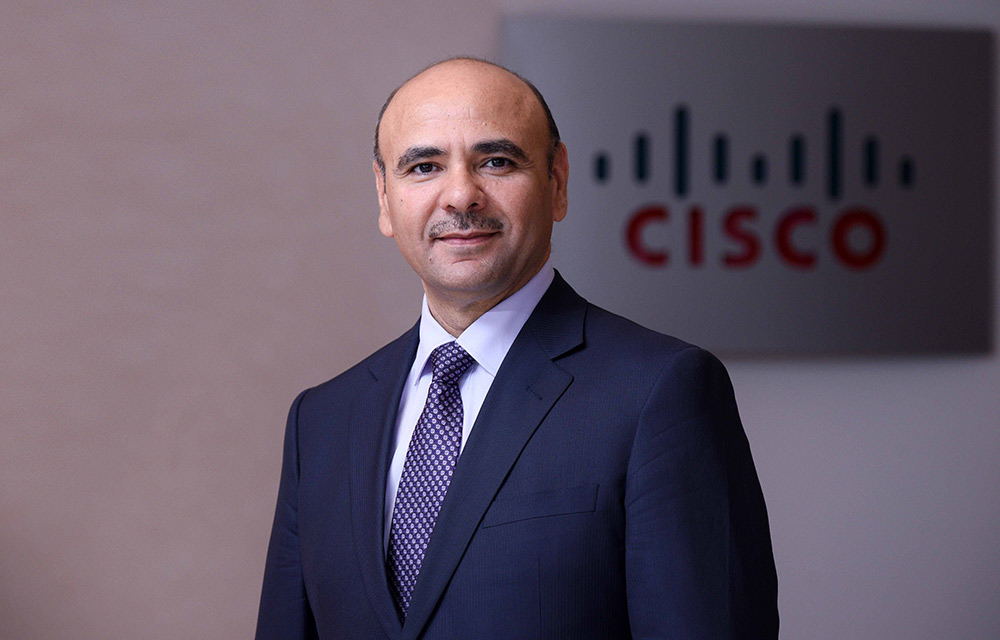Articles by Ziad Salameh, MD and GM, west region of Cisco Middle East
Countries, regions and the world at large face a growing list of challenges. Food, water, job creation and widening gap between rich and poor appear insufficient, driving social and political instability. However, there appear to be solutions to tackle these insurmountable challenges.
One of the most significant changes in the coming years will be the dramatic increase in global connectivity via the Internet. The Internet of Things and related technologies will help to connect people, data and devices in all countries. Coupled with the new generation of workers, and increasing awareness of businesses on matters other than their bottom-line, there is reason for optimism. Put together, the potential for countries to prosper in the coming decade is significant.
In this digital age that we have entered, 500 billion people and things will be connected by 2030. Countries and regions that were left behind in the information age will have the ability to move forward. They will have data and knowledge to make the right decisions helping their lives to change for the better. Standards of healthcare, education and transportation will improve in these countries, that were once left behind.
As an example, across Middle East and Africa where we are looking at the highest growth rate in the world, 2.4 billion new devices and connections and 445 million new Internet users will be added by 2020.
However, all these changes cannot occur without the network. Digital networks have the capacity to connect every person, every country and every connected device. Global networks allow data to flow unimpeded, driving growth and enabling innovation in many areas.
Those countries that foster digital activity will see new industries emerge and experience accelerated development of traditional markets. This is why broadband Internet has been categorised as one of the world’s most important general-purpose technologies, with the capability to dramatically impact social structures and economies.
But even with broadband Internet, regions like Middle East and Africa still have some way to go. Only 1% of the broadband connections will have a speed in excess of 100Mbps by 2020.
All these changes have brought the world to a tipping point. We are now in the process of transitioning into the Fourth Industrial revolution that is being built on digital economies and technology infrastructures. In this world, growth rates can be exponential and the ways in which we live, work and relate to each other are going to change fundamentally.
In order to achieve global sustainable development goals in the next decade, digitalisation needs to be included in any discussion regarding sustainable development. Megatrends such as mobile Internet, Internet of Things and big data are creating opportunities faster than ever. Digital technologies are a crucial driver for work, growth and well-being.
Cisco believes that technology has the capability to transform lives and recognises the important role it can play in helping to reduce carbon footprint of businesses.
In cities from Barcelona to Songdo to Rio de Janeiro, Internet protocol connected sensors are monitoring traffic patterns, providing city managers with key data on how to improve operations and communicate transportation options. Similar information flows are improving hospitals and healthcare systems, education delivery and basic government services such as safety, fire and utilities.
Sensors in manufacturing plants, mining operations and oil fields are helping to raise production, lower costs and increase safety. In both developed and developing countries, the Internet of Things is helping monitor critical vaccines through use of IP-connected thermometers. Moisture sensors in agricultural fields alert farmers to the exact needs of food crops, and acoustic sensors in protected rainforests are helping to curb illegal logging.
Cisco has developed a Country Digitisation Acceleration strategy. Connecting the unconnected, accelerating GDP growth, creating new jobs and building a sustainable innovation ecosystem are core principles that define digitisation. Country Digitisation Acceleration is a long-term commitment with national leadership, industry and academia to deliver outcomes faster and effectively.
By accelerating the national digitisation agenda, Cisco can help countries grow, create new jobs, provide innovation and invest in a sustainable innovation ecosystem.
The challenges confronting the world are complex and cannot be solved by any single government, industry or organisation. But these problems are not insurmountable and one way to move forward is to connect social mindsets of young workers to the power of technology.
Never before have people and companies been so motivated to help the world. A growing number of today’s new workers believe that work and social responsibility go hand in hand. A large majority believe that a business has at least as much potential as government to solve society’s problems.
A new economy is taking shape, that requires innovation in governance and regulation. Offering it the right conditions will be crucial to ensuring sustainability. If we want people-centred, inclusive and development-oriented information societies, where all have access to digital technologies, legal frameworks need to be put in place. These are required to protect security and privacy and to avoid intrusions.
Agile governance frameworks allow societies to anticipate the impact of technologies and react to changing circumstances. Once completed, digitisation is itself a driver for success in driving informed policy.
All stakeholders including governments, businesses, technical community, citizens and consumers play a role in building trust and confidence in global networks. The global Internet must be allowed to further develop without obstacles.
Click below to share this article

